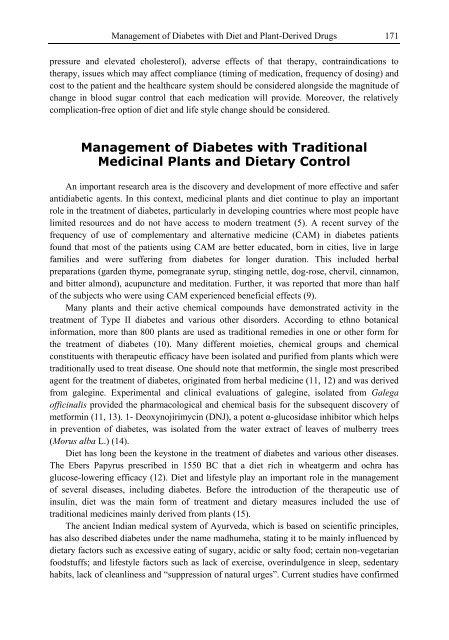Medicinal Plants Classification Biosynthesis and ... - Index of
Medicinal Plants Classification Biosynthesis and ... - Index of
Medicinal Plants Classification Biosynthesis and ... - Index of
You also want an ePaper? Increase the reach of your titles
YUMPU automatically turns print PDFs into web optimized ePapers that Google loves.
Management <strong>of</strong> Diabetes with Diet <strong>and</strong> Plant-Derived Drugs<br />
pressure <strong>and</strong> elevated cholesterol), adverse effects <strong>of</strong> that therapy, contraindications to<br />
therapy, issues which may affect compliance (timing <strong>of</strong> medication, frequency <strong>of</strong> dosing) <strong>and</strong><br />
cost to the patient <strong>and</strong> the healthcare system should be considered alongside the magnitude <strong>of</strong><br />
change in blood sugar control that each medication will provide. Moreover, the relatively<br />
complication-free option <strong>of</strong> diet <strong>and</strong> life style change should be considered.<br />
Management <strong>of</strong> Diabetes with Traditional<br />
<strong>Medicinal</strong> <strong>Plants</strong> <strong>and</strong> Dietary Control<br />
An important research area is the discovery <strong>and</strong> development <strong>of</strong> more effective <strong>and</strong> safer<br />
antidiabetic agents. In this context, medicinal plants <strong>and</strong> diet continue to play an important<br />
role in the treatment <strong>of</strong> diabetes, particularly in developing countries where most people have<br />
limited resources <strong>and</strong> do not have access to modern treatment (5). A recent survey <strong>of</strong> the<br />
frequency <strong>of</strong> use <strong>of</strong> complementary <strong>and</strong> alternative medicine (CAM) in diabetes patients<br />
found that most <strong>of</strong> the patients using CAM are better educated, born in cities, live in large<br />
families <strong>and</strong> were suffering from diabetes for longer duration. This included herbal<br />
preparations (garden thyme, pomegranate syrup, stinging nettle, dog-rose, chervil, cinnamon,<br />
<strong>and</strong> bitter almond), acupuncture <strong>and</strong> meditation. Further, it was reported that more than half<br />
<strong>of</strong> the subjects who were using CAM experienced beneficial effects (9).<br />
Many plants <strong>and</strong> their active chemical compounds have demonstrated activity in the<br />
treatment <strong>of</strong> Type II diabetes <strong>and</strong> various other disorders. According to ethno botanical<br />
information, more than 800 plants are used as traditional remedies in one or other form for<br />
the treatment <strong>of</strong> diabetes (10). Many different moieties, chemical groups <strong>and</strong> chemical<br />
constituents with therapeutic efficacy have been isolated <strong>and</strong> purified from plants which were<br />
traditionally used to treat disease. One should note that metformin, the single most prescribed<br />
agent for the treatment <strong>of</strong> diabetes, originated from herbal medicine (11, 12) <strong>and</strong> was derived<br />
from galegine. Experimental <strong>and</strong> clinical evaluations <strong>of</strong> galegine, isolated from Galega<br />
<strong>of</strong>ficinalis provided the pharmacological <strong>and</strong> chemical basis for the subsequent discovery <strong>of</strong><br />
metformin (11, 13). 1- Deoxynojirimycin (DNJ), a potent α-glucosidase inhibitor which helps<br />
in prevention <strong>of</strong> diabetes, was isolated from the water extract <strong>of</strong> leaves <strong>of</strong> mulberry trees<br />
(Morus alba L.) (14).<br />
Diet has long been the keystone in the treatment <strong>of</strong> diabetes <strong>and</strong> various other diseases.<br />
The Ebers Papyrus prescribed in 1550 BC that a diet rich in wheatgerm <strong>and</strong> ochra has<br />
glucose-lowering efficacy (12). Diet <strong>and</strong> lifestyle play an important role in the management<br />
<strong>of</strong> several diseases, including diabetes. Before the introduction <strong>of</strong> the therapeutic use <strong>of</strong><br />
insulin, diet was the main form <strong>of</strong> treatment <strong>and</strong> dietary measures included the use <strong>of</strong><br />
traditional medicines mainly derived from plants (15).<br />
The ancient Indian medical system <strong>of</strong> Ayurveda, which is based on scientific principles,<br />
has also described diabetes under the name madhumeha, stating it to be mainly influenced by<br />
dietary factors such as excessive eating <strong>of</strong> sugary, acidic or salty food; certain non-vegetarian<br />
foodstuffs; <strong>and</strong> lifestyle factors such as lack <strong>of</strong> exercise, overindulgence in sleep, sedentary<br />
habits, lack <strong>of</strong> cleanliness <strong>and</strong> ―suppression <strong>of</strong> natural urges‖. Current studies have confirmed<br />
171


